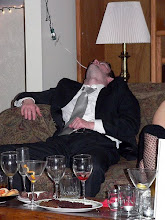Howard, Carl, Leonard, Joseph, and Dean. Miskatonic class of ‘28. When you’ve been dead this long, hunted this long, feared this long, you can’t relate to people who haven’t seen what you’ve seen, been through what you’ve been through. Carl has been carrying his head under his arm so long, he has terrific muscle memory in what muscles he has left. Take the head away he becomes anxious and alarmed at its absence.
Of course he’s anxious and alarmed also because he’s missing his head.
There is something that happens to the vocal chords after death. A slow atrophy, mixed with the chemical stimulants that give the barbershop quartet (and their conductor, Headless Carl) an eerie, discordant undertone. The Dead Song. Young men with their entire futures ahead of them, they made the kind of pact with eldritch terrors a person makes when he has his whole life ahead of him. They would learn, and sing, the Dead Song.
They poured over old manuscripts. They knew what would be expected of them. The call of the song was too great. Barbershop was a big deal in the ‘20’s, you know. Type of thing makes a man pursue decisions, terrible decisions. Their relationships, their families, their perspectives, and finally their flesh rotted away, exposed the men they were all along, walking dead, walking singing dead.
It is said the Dead Song drives men mad. And it does. But many songs drive men to madness. Madness is a short drive from nearly every street. The type of madness that drives five friends, eighty-seven years long gone, to seek out the strange low baritone of the resurrected and to pursue it to strange and terrifying ends. To the point where for each of them only the other four could speak to the experiences of un-life.
Except Headless Carl. Headless Carl was never the same after Eurovision.
Forever stretches away, and they keep singing. Lovers, children, grandchildren, they will all wilt and fall away, leaving only the Song, only ever the Song remains.
Of course he’s anxious and alarmed also because he’s missing his head.
There is something that happens to the vocal chords after death. A slow atrophy, mixed with the chemical stimulants that give the barbershop quartet (and their conductor, Headless Carl) an eerie, discordant undertone. The Dead Song. Young men with their entire futures ahead of them, they made the kind of pact with eldritch terrors a person makes when he has his whole life ahead of him. They would learn, and sing, the Dead Song.
They poured over old manuscripts. They knew what would be expected of them. The call of the song was too great. Barbershop was a big deal in the ‘20’s, you know. Type of thing makes a man pursue decisions, terrible decisions. Their relationships, their families, their perspectives, and finally their flesh rotted away, exposed the men they were all along, walking dead, walking singing dead.
It is said the Dead Song drives men mad. And it does. But many songs drive men to madness. Madness is a short drive from nearly every street. The type of madness that drives five friends, eighty-seven years long gone, to seek out the strange low baritone of the resurrected and to pursue it to strange and terrifying ends. To the point where for each of them only the other four could speak to the experiences of un-life.
Except Headless Carl. Headless Carl was never the same after Eurovision.
Forever stretches away, and they keep singing. Lovers, children, grandchildren, they will all wilt and fall away, leaving only the Song, only ever the Song remains.





No comments:
Post a Comment